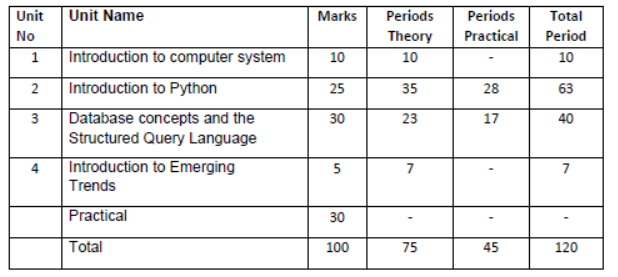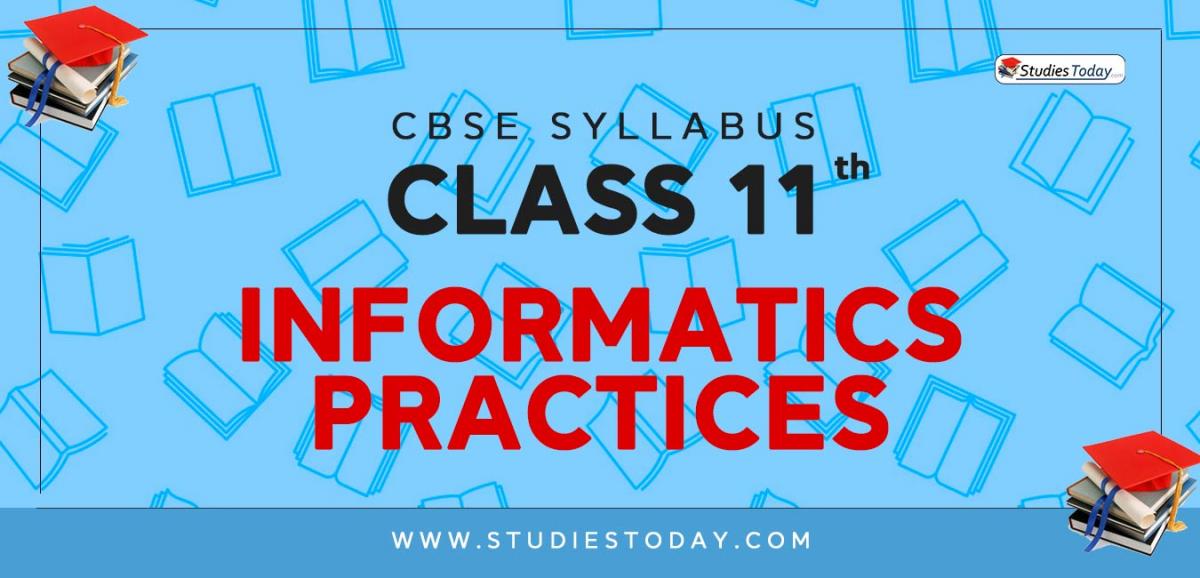Download CBSE Class 11 Syllabus for Informatics Practices 2023 2024. Refer to the latest syllabus provided below and free download latest curriculum of Class 11 for Informatics Practices issued by CBSE and NCERT, free download in pdf, get topic wise weightage, suggested readings and books based on latest syllabus and guidelines. The Informatics Practices Class 11 Syllabus curriculum has been developed and issued by CBSE and NCERT for Informatics Practices in Class 11. All students studying in Class 11 are suggested to go through latest syllabus to ensure that their preparation is as per the latest syllabus issued by CBSE NCERT KVS. Class 11 Informatics Practices students should do preparation for Informatics Practices exam strictly based on the latest curriculum and concentrate more on the topics with higher weightage to help them score higher marks in Class 11 Informatics Practices class tests and exams
Class 11 Informatics Practices Syllabus
It is important for students to study as per the latest Class 11 Informatics Practices curriculum and marks breakup as per important topics. This will help to prepare properly for the upcoming examination. You can click on the following links to download the latest and past year syllabus provided by us below.
Year Wise Informatics Practices Syllabus Class 11
Informatics Practices (2023-24)
CLASS XI Code No. 065
1. Prerequisite. None
2. Learning Outcomes
At the end of this course, students will be able to:
● Identify the components of computer system.
● Create Python programs using different data types, lists and dictionaries.
● Understand database concepts and Relational Database Management Systems.
● Retrieve and manipulate data in RDBMS using Structured Query Language
● Identify the Emerging trends in the fields of Information Technology.
3. Distribution of Marks and Periods

4. Unit Wise syllabus
Unit 1: Introduction to Computer System
Introduction to computer and computing: evolution of computing devices, components of a computer system and their interconnections, Input/output devices.
Computer Memory: Units of memory, types of memory – primary and secondary, data deletion, its recovery and related security concerns.
Software: purpose and types – system and application software, generic and specific purpose software.
Unit 2: Introduction to Python
Basics of Python programming, Python interpreter - interactive and script mode, the structure of a program, indentation, identifiers, keywords, constants, variables, types of operators, precedence of operators, data types, mutable and immutable data types, statements, expressions, evaluation and comments, input and output statements, data type conversion, debugging.
Control Statements: if-else, if-elif-else, while loop, for loop
Lists: list operations - creating, initializing, traversing and manipulating lists, list methods and built-in functions – len(),list(),append(),insert(), count(),index(),remove(), pop(), reverse(), sort(), min(),max(),sum()
Dictionary: concept of key-value pair, creating, initializing, traversing, updating and deleting elements, dictionary methods and built-in functions – dict(), len(), keys(), values(), items(), update(), del(), clear()
Unit 3: Database concepts and the Structured Query Language
Database Concepts: Introduction to database concepts and its need, Database Management System.
Relational data model: Concept of domain, tuple, relation, candidate key, primary key, alternate key
Advantages of using Structured Query Language, Data Definition Language, Data Query Language and Data Manipulation Language, Introduction to MySQL, creating a database using MySQL, Data Types
Data Definition: CREATE DATABASE, CREATE TABLE, DROP, ALTER
Data Query: SELECT, FROM, WHERE with relational operators, BETWEEN, logical operators, IS NULL, IS NOT NULL
Data Manipulation: INSERT, DELETE,UPDATE
Unit 4: Introduction to the Emerging Trends
Artificial Intelligence, Machine Learning, Natural Language Processing, Immersive experience (AR, VR), Robotics, Big data and its characteristics, Internet of Things (IoT), Sensors, Smart cities, Cloud Computing and Cloud Services (SaaS, IaaS, PaaS); Grid Computing, Block chain technology.
Practical Marks Distribution
S.No. Unit Name Marks
1 Problem solving using Python programming language 11
3 Creating database using MySQL and performing Queries 7
4 Practical file (minimum of 14 python programs, and 14 SQL queries) 7
5 Viva-Voce 5
Total 30
5. Suggested Practical List
5.1 Programming in Python
1. To find average and grade for given marks.
2. To find sale price of an item with given cost and discount (%).
3. To calculate perimeter/circumference and area of shapes such as triangle, rectangle, square and circle.
4. To calculate Simple and Compound interest.
5. To calculate profit-loss for given Cost and Sell Price.
6. To calculate EMI for Amount, Period and Interest.
7. To calculate tax - GST / Income Tax.
8. To find the largest and smallest numbers in a list.
9. To find the third largest/smallest number in a list.
10. To find the sum of squares of the first 100 natural numbers.
11. To print the first ‘n’ multiples of given number.
12. To count the number of vowels in user entered string.
13. To print the words starting with a alphabet in a user entered string.
14. To print number of occurrences of a given alphabet in each string.
15. Create a dictionary to store names of states and their capitals.
16. Create a dictionary of students to store names and marks obtained in 5 subjects.
17. To print the highest and lowest values in the dictionary.
5.3 Data Management: SQL Commands
18. To create a database
19. To create student table with the student id, class, section, gender, name, dob, and marks as attributes where the student id is the primary key.
20. To insert the details of at least 10 students in the above table.
21. To display the entire content of table.
22. To display Rno, Name and Marks of those students who are scoring marks more than 50.
23. To display Rno, Name, DOB of those students who are born between ‘2005- 01-01’ and ‘2005-12-31’.
Suggested material
NCERT Informatics Practices - Text book for class - XI (ISBN- 978-93-5292-148-5 )
You can download the CBSE 2025 Syllabus for Class 11 Informatics Practices for latest session from StudiesToday.com
Yes, you can click on the links above and download Syllabus in PDF for Class 11 for Informatics Practices
Yes, the syllabus issued for Class 11 Informatics Practices have been made available here for latest 2025 academic session
You can easily access the links above and download the Class 11 Syllabus Informatics Practices
There is no charge for the Syllabus for Class 11 CBSE Informatics Practices you can download everything free
Planning your studies as per syllabus given on studiestoday for Class 11 subject Informatics Practices can help you to score better marks in exams
Yes, studiestoday.com provides all latest CBSE Class 11 Informatics Practices Syllabus with suggested books for current academic session
Yes, studiestoday provides curriculum in Pdf for Class 11 Informatics Practices in mobile-friendly format and can be accessed on smartphones and tablets.
Yes, syllabus for Class 11 Informatics Practices is available in multiple languages, including English, Hindi


